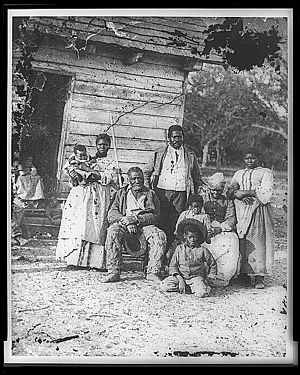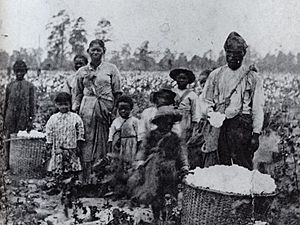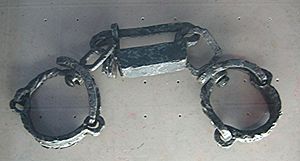Slave Power facts for kids
Slave Power was a term used a long time ago in the United States. It described the huge influence that people who owned slaves had. This power was seen in the economy, society, and government of the South.
These slave owners had a lot of power in the U.S. Congress. They also held many important jobs in the federal government, even the presidency. These powerful people used their influence to keep slavery going. People in the North worried that the "Slave Power" wanted to spread slavery. They feared it would go into the Western territories and even into the Northern states.
Contents
Slavery's Start in America

Slavery in America began in 1619. This was in the English colony of Jamestown. It started when 20 Africans were bought from an English warship. This ship was called the White Lyon.
The colonists in the Virginia Colony first bought these Africans as indentured servants. This meant they worked for a set time to pay off a debt. But soon, it became common to hold slaves for their entire lives.
People who supported slavery had many reasons why they thought it was right. They said that without slave labor, the Southern economy would be ruined. They believed farmers could not grow crops like cotton, tobacco, or rice without slaves.
They also claimed that freeing slaves would cause many problems. They thought it would lead to lots of unemployment and even uprisings. They pointed to the French Revolution as an example of chaos. They also said slavery had existed throughout history and was even mentioned in the Bible.
How Slave Owners Gained Wealth
Plantations in the South could make a lot of money. Only a small number of people owned slaves, and this was mostly in the Southern states. Slaves were seen as a huge source of wealth.
The buying and selling of new slaves from Africa was stopped in the United States after January 1, 1808. But owning slaves who were already in the country was still legal. Before 1808, slave traders became very rich by bringing slaves to America.
Some slave owners had enormous wealth. For example, Joshua John Ward from Georgetown County, South Carolina owned 1,130 slaves. He controlled six large plantations. Another rich owner was Stephen Duncan. He was the wealthiest cotton planter before the Civil War. Over his life, he owned more than 2,000 slaves. He had 15 plantations, and his largest one used 858 slaves.
Political Influence of Slave Power
The Fugitive Slave Act of 1850 was a big political win for the South. This law created a new group of officials. These officials were paid by the federal government for each person they captured. They got a reward for catching slaves, or people they claimed were slaves.
This new law was very powerful. It ignored laws in Northern states that protected free black people. It also meant that people accused of being runaway slaves did not get a fair trial. The Fugitive Slave Act allowed Southern states to use the federal government to enforce their rules in the North.
Presidents Who Owned Slaves
Many presidents before the American Civil War were from the South. Most of them also owned slaves. These presidents often played a big part in keeping slavery strong.
One reason so many presidents were from the South was the Electoral College system. Southern states, especially Virginia, had an advantage in this system.
Washington, D.C. was chosen as the United States Capitol for a key reason. It was near Alexandria, Virginia, a town where slavery was common. New York City was in a free state. In Philadelphia, a slave could only be kept for six months before becoming free. This was not convenient for politicians who owned slaves. George Washington, Thomas Jefferson, and James Madison, all slave owners from the South, helped choose Washington D.C.
| U.S. President | From | Number of slaves |
|---|---|---|
| George Washington | Virginia | 250–350 |
| Thomas Jefferson | Virginia | about 200 |
| James Madison | Virginia | over 100 |
| James Monroe | Virginia | about 75 |
| Andrew Jackson | South Carolina/Tennessee | less than 200 |
| William Henry Harrison | Virginia | 11 |
| John Tyler | Virginia | about 70 |
| James K. Polk | North Carolina | about 25 |
| Zachary Taylor | Virginia | less than 150 |
| Andrew Johnson | North Carolina | about 8 |
See also
 In Spanish: Potencia negrera para niños
In Spanish: Potencia negrera para niños
 | Victor J. Glover |
 | Yvonne Cagle |
 | Jeanette Epps |
 | Bernard A. Harris Jr. |



